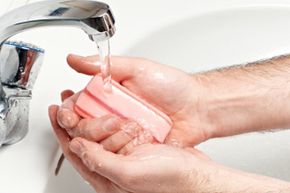If you've ever looked closely when pouring water into an oil-laden frying pan in your sink, you've noticed that water beads up on the oily surface. Likewise, if you've ever poured a little oil into a bowl of water, you noticed the oil beading up and refusing to mix with the water. But why is this, and what does it have to do with soap?
Dirt that clings to your skin is usually a fat- or oil-based substance. When you wash with water alone, non-oily dirt is carried off the skin while oils or lipids stay on. Since oil and water don't mix, water passes over your skin without bonding to the grime.
Advertisement
Soap brings the two together. Soap is a cleansing agent formed from a mix of sodium salts derived from naturally occurring fatty acids. One end of a soap molecule is attracted to water, while the other end of the same molecule is attracted to oils and lipids. Each end has its preference, and it's a strong preference -- soap molecules turn and stand on end when placed in water, as the water-loving end burrows downward and the water-loathing end juts out of the water. When you rub soapy water over your skin, the dirt-attracting end of the soap molecule attaches to the dirt, while the other end of the molecule remains firmly rooted in the water. If the dirt shifts during the course of washing, exposing a new surface that previously had been facing the skin, the dirt-loving end of the soap molecule will attach to it, eventually surrounding the dirt entirely in a sort of protective cocoon. Dirt now becomes the protected occupant of a soapy submarine that travels freely through the water without letting the water touch the cargo. And this is how soap removes dirt from your skin.
Regularly stripping away oils and fats isn't a good long-term strategy for maintaining a healthy, attractive appearance. That's why soaps contain any number of moisturizers, non-detergent cleansers and exfoliating agents, in addition to whatever synthetic cleansers, preservatives and fillers that the manufacturer has added.
Men can benefit from using soap tailored specifically for their skin, and men's skin has its own unique properties, along with individual differences. So how are men's soaps different from others? Keep reading to find out.
Advertisement


